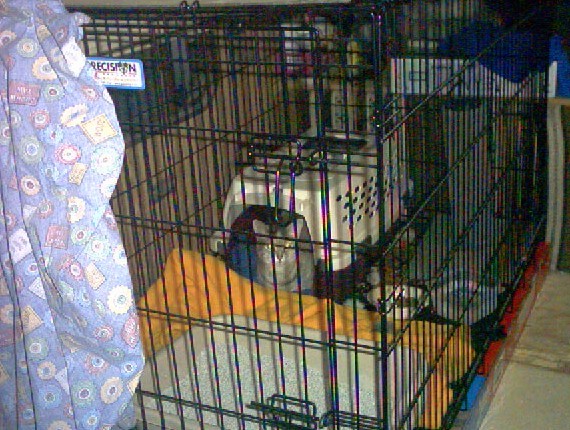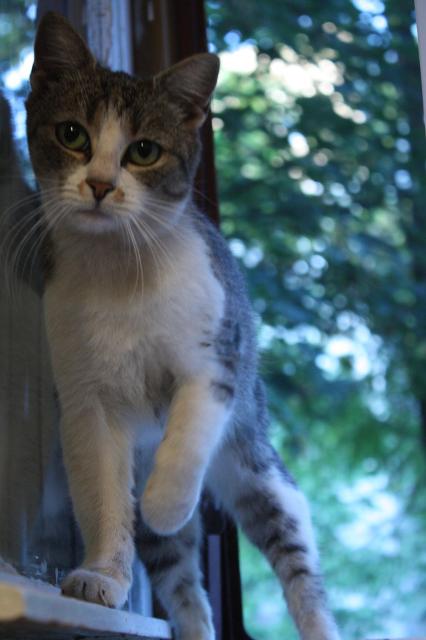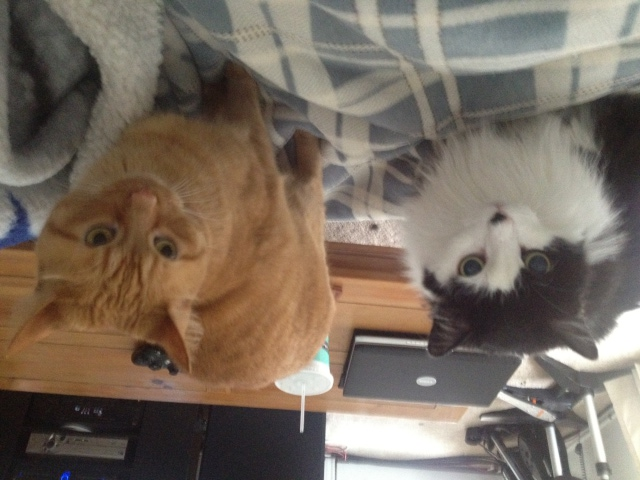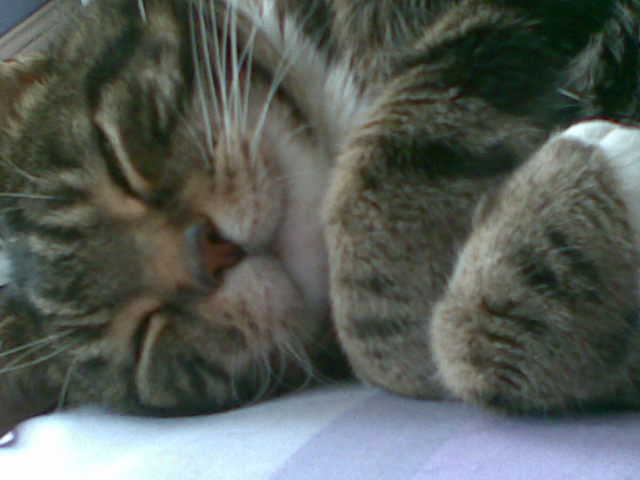QuestionWe have been having a problem with Mocha, our siamese kitten (petshop bought). First let me say I don't believe this is a problem of the breed, because I have had TONS of siamese over the yrs and have never had this problem. He will pounce and use his paws (with claws!) to grab your hand or arm and pull it toward him and then proceed to chew OBSESSIVELY on your hand, thumb, etc. If you try to ignore it and allow him, then he will continue to chew, almost also in a suckling manner, and purr, until you force him away. Then, he forcefully jumps back on you, again grabbing you with his paws, and repeats the behavior. A few times I got agitated and knocked him off of me rather forcefully but he just comes back for more, like he is physically craving my skin. It almost makes me think of a male holding down a female with his teeth to mate her, but he is only around 3 months old or so. If I thought it would help to go ahead and get him fixed, I would, but he seems young to be showing that kind or behavior yet. I will keep pushing/knocking him down until I'm so irritated I just lock him in the bathroom, but as soon as we let him out it's just more of the same and we are on the verge of getting rid of him. He is a full-blooded siamese that we paid $200 in for and I would like to make this work but he is making me hate him with his extreme behavior. Should we take him to the vet? Get him fixed? Please advise. Thank you!!
AnswerJennifer,
Regardless of the breed I think that this is more an issue of premature weaning. The behavior that you describe sounds very much like a kitten that was taken from mom too early or hand reared. It's a difficult behavior to completely stop, you can however work towards getting your kitten to focus the behavior somewhere else. Kittens that have been weaned too early or hand reared tend to have self soothing behaviors such as sucking on human body parts, blankets, stuffed toys, other pets....I have a 9 year old cat that I hand reared and she started off by sucking my hair, ear lobes, lips, fingers and other pets in the household...I have been able to redirect the behavior, but as of yet I haven't been able to completely stop it. Many cats with this behavioral issue seem to have a sense of urgency when they are looking for comfort by using behavior like this. It sounds to me like the previous owner may well have allowed the behavior which can make it difficult to convince Mocha that it isn't appropriate in your home. I would suggest that you not continue to lock Mocha in the washroom, it will intensify his anxiety and make the issue worse. Instead, every time that Mocha comes to you and starts the behavior place him on the floor and tell him NO! in a firm voice. I will forewarn you, initially Mocha is likely to be confused and more determined to repeat the suckling behavior. In order to have the best chance of being successful in at least redirecting the behavior it is important to be consistent and persistent, now that you are aware of what the issue is it is important that no person allows Mocha to "nurse" on any part of their body. I really doubt that Mocha's behavior is sexual in nature, but I am aware that Siamese cats sometimes mature much more quickly than your average house cat so it is worth speaking to your vet and asking about early neutering. I would expect to have you describe more of a mounting behavior in terms of grabbing your forearm with his teeth and thrusting against your hand or arm if this were sexual in nature.
I would also see about having Mocha aged by your family vet and contacting your local humane law enforcement if Mocha is younger than the breeder has told you. It isn't unheard of for "backyard" breeders to fudge documentation surrounding age, medical history, and even pedigree. If Mocha came from the feline equivalent of a puppy mill it is important to let the authorities know so that nobody else has to deal with a traumatized cat or kitten with dysfunctional behaviors. $200 actually is fairly minimal for a purebred kitten of any breed. Many reputable breeders sell their pet quality kittens for in excess of $500. A good breeder should be able to tell you about common behaviors, medical issues, and other common issues that come up with your breed. Many folks who are backyard breeders are simply in it for the financial gain, the animals and their health and comfort are usually given minimal attention. Any reputable breeder will tell you that financial gain really isn't why they breed, they do it for the love of the animals. If the breeder seemed like they had something to hide they could potentially be less than reputable. Most breeders with a proper set up will be glad to show you the premises, where any resident studs are housed, where any nursing kittens and their mothers are housed and talk about the care and maintenance of their cattery. If you weren't allowed to meet the mother cat that may mean that your breeder has something to hide...Sometimes studs are flown in from other locations to mate, so there is a possibility that you won't be able to meet the stud, but you should be able to find out what cattery he comes from and see documentation proving it.
You may also want to try a homeopathic remedy called Bach's Rescue Remedy which is a blend of flower essences that helps to calm and reassure. You can generally find Rescue Remedy in health food/natural health stores. I would recommend that you give Mocha about 8 drops per day in a bowl of fresh water. You should start to see a difference in Mocha's anxiety and his determination to nurse on hands. In my honest opinion it may be worth your while to visit your family vet and be sure to document efforts to change Mocha's behavior. It is possible that the Rescue Remedy won't settle Mocha down enough to allow him to redirect his self soothing behaviors. Your vet may have to intervene with an anti-anxiety drug, but it is important that you understand that many drugs used to treat anxiety and depression in cats are small doses of human anti-depressant/anti-anxiety drugs. Be sure to educate yourself about potential side effects or risks of using these drugs by speaking to your veterinarian and a pharmacist.
I hope that you have found this information helpful. If you have any further questions or concerns, or you would simply like to send some pictures or an update my way, please don't hesitate to contact me again.

 vacation house and taking cat
Questionour permanent home is on a 3 acre semi wooded p
vacation house and taking cat
Questionour permanent home is on a 3 acre semi wooded p
 Cat meaowing after spayed
QuestionQUESTION: Hello, I am having a problem with my
Cat meaowing after spayed
QuestionQUESTION: Hello, I am having a problem with my
 Cat peeing on floor after other cat died
Question
My babies
I have a 6 year old tabby (my
Cat peeing on floor after other cat died
Question
My babies
I have a 6 year old tabby (my
 my cat!
QuestionQUESTION: I recently e-mailed a question to you
my cat!
QuestionQUESTION: I recently e-mailed a question to you
 Cat in Heat with a little blood in her stool
Question
Millie Moo
Hi, I have a 5 month old female kit
Cat in Heat with a little blood in her stool
Question
Millie Moo
Hi, I have a 5 month old female kit